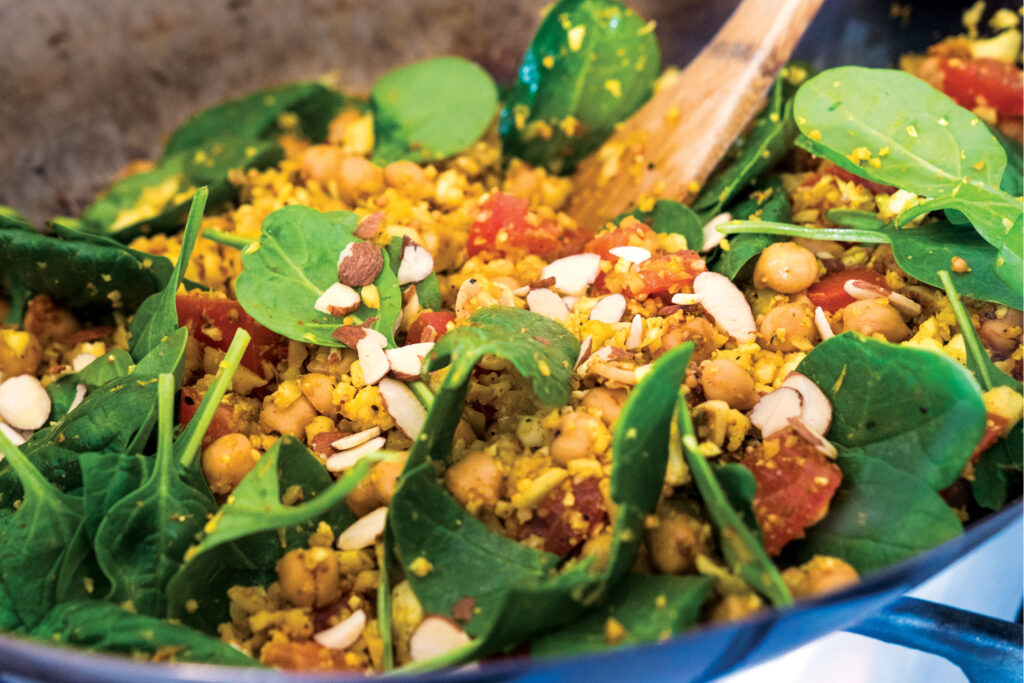Advertisement
Stir It Up
Wok your way toward worldly stir-fries

No, we don’t think a full-blown food fight is a good idea in any kitchen, but that shouldn’t stop you from getting in the habit of throwing around your haul from the market more often. There’s simply no better way to get a meal on the table in a flash than by quickly tossing around your ingredients in a red-hot pan—also known as the time-honoured stir-fry. (Why do you think it’s the preferred cooking method in bustling Asian street food markets?)
Best of all, the lightning-fast cooking that is the backbone of stir-frying preserves the texture, flavour, and nutrients of your ingredients. That means a plate full of succulent browned meats and crisp, bright vegetables full of wok hay, the delicious seared, slightly smoky taste that you’ve luxuriated in at any good (Cantonese) Chinese restaurant.
And single-pan stir-frying offers easy clean-up, leaving you plenty of time to attend to pressing matters like checking your Instagram feed. And don’t overlook the fact that stir-frying also tends to make for tasty leftovers.
It’s important, though, not to pigeonhole stir-frying as something that only works with Asian flavours. Seemingly endless ingredients cherished by cultures from around the world can also benefit from time spent in a wok. So consider these sizzling stir-fry recipes your (valid) passport to flavour.
Advertisement
Stir-fry recipes
Masala Chickpea Stir-Fry with Golden Cauliflower Rice
Tofu Kimchi Stir-Fry
Burmese-style Chicken Stir-Fry
Halloumi Eggplant Stir-Fry
Nordic Char and Rye Stir-Fry
Wok star
Pulling off a great stir-fry takes more than just dumping a bunch of ingredients into a hot pan. Make note of these tips to master this ancient form of cookery.
Pan handling
The high sides that act as an extra cooking surface and high heat tolerance (read: no warping) makes a voluminous 14 in (35 cm) carbon steel flat-bottomed wok the ideal tool for stir-frying like a champ. And with plenty of use, it develops a natural nonstick surface, meaning you can save on oily calories. A heavy gauge large stainless steel skillet is a good alternative. Use a thin, flexible metal spatula so it can easily slip under foods in the pan.
The right oil
Leave the expensive extra-virgin olive oil for salads. Stir-frying requires using oils that have higher smoke points, since you’ll be cooking with fairly high heats. Heat your pan just to the point where water droplets vaporize on impact before adding the oil. Here are some oils to try.
- avocado
- grapeseed
- rice bran
- organic canola
- peanut
- coconut
Set up shop
Stir-frying is a fast and furious cooking method, so have all your ingredients pre-chopped and sauces mixed before lighting the flame. Slice meats and vegetables to uniform sizes for even cooking.
Order matters
Use this pecking order when stir-frying: Start with meats, followed by dense vegetables like carrots and broccoli, and then softer ingredients including bell peppers and mushrooms. Very delicate items such as leafy greens are added at the end, just before any sauces go in the pan. Use only quick-cooking proteins such as chicken breast, shrimp, tofu, scallops, or pork tenderloin.
Crowd control
Overcrowding your pan can bring down the heat of the wok, causing your ingredients to steam instead of stir-fry. That can mean soggy instead of crisp veggies and meats that won’t achieve delicious browning. You always want to hear a sizzle, so don’t be afraid to cook in batches if necessary.
For instance, you can cook your meat first, remove it from the pan, and then add your vegetables. Roughly, you want no more than 1 lb (2.25 g) of raw meat or 4 cups (1 L) of uncooked chopped vegetables in the pan at once. And be sure all washed veggies are dried before they hit the pan.
Patience pays
Spread meats in a single layer in your pan and let them sear undisturbed for about a minute. This promotes caramelization (yum!) and reduces sticking.










